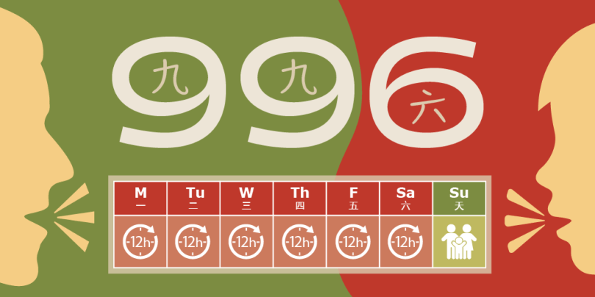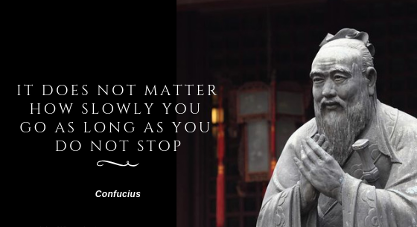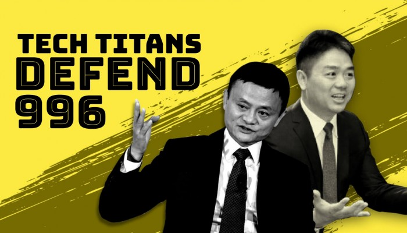EXPLANATORY | Chinese 996 Working Hour System: Potion or Poison?
Introduction
If you are from a country other than China, you may have noticed one notable difference between the workplace in China and other countries: the amount of time employees put in. Chinese people indeed work much longer than people in the United States, Britain, Australia, and other countries. The 996 debate began with a simple post on GitHub in China, March 2019. It has attracted full attention all over the world. Some prominent Chinese developers have protested this unjustified system, but many well-known industry leaders have publicly expressed their support for it. To help you better understand the “996” working hour system, we will analyze the social reasons for the prevalence of this work system, and introduce the different views on it in China.
What is 996 Working Hour System?

The “996” working hour system is a working system commonly adopted by some companies in China. Literally, it refers to the working time of 9:00 a.m. to 9:00 p.m., six days a week, which adds up to 72 hours per week. This working system accurately represents the overtime culture prevailing in Chinese Internet companies, since many abundant Chinese Internet companies have made the system their official agenda. GitHub is an online community where programmers around the world can share code and software tools. One anonymous user posted under the pseudonym “996icu”, referring to how developers working under the 996 system would risk poor health and a possible stay in an intensive care unit (Liu & Zhong, 2019).
Here are some links to relevant news reports for your further reading:
- 1. The New York Times
https://www.nytimes.com/2019/04/29/technology/china-996-jack-ma.html
- 2. Forbes
- 3. The Guardian
What are the Social Reasons Behind 996 Working Hour System?
Although the “996” working hour system has received a lot of attention and controversy since March this year, its widespread application in the Chinese workplace is indisputable. So, what makes this system so prevalent in China while many people consider it oppressive and laborious?
Chinese Work Ethic Influenced by Confucianism

In the Chinese Confucian cultural tradition, it contains ideas that promote diligence, hard work, and perseverance. For example, the Confucian holy book “Mencius” (c. 300 BC) explains “Chiku” (perseverance through hardship) as:
“When heaven is about to confer a great responsibility on any man, it will exercise his mind with suffering, subject his sinews and bones to hard work, expose his body to hunger, put him to poverty, place obstacles in the paths of his deeds, so as to stimulate his mind, harden his nature, and improve wherever he is incompetent” (“The Works of Mencius: Book 6, Part 2 (cont.),” n.d.)
Based on these Confucian principles, Chinese people learn from school onwards that they can achieve anything through hard work and diligence rather than just through talent. Such ideas are almost like a religion that has profoundly impacted Chinese people. Therefore, for most Chinese people, they will not immediately shirk away from the “996” working hour system but embrace it, believing in the success that will be brought about.
More detailed information about Confucianism’s viewpoints on hardship: http://www.jimsjournal.org/3%20Charles.pdf
Chinese Corporate Structure Driven “996”

If you are westerners, you must know that in the West, the job distribution in the company is very hierarchical. It is not easy for employees to rise from the bottom of the organization to senior positions. However, in China, the situation is very different. There are more opportunities for career development, and job competition within enterprises is very fierce. As a result, facing the threat of promotion opportunities and being abandoned, employees have to accept longer working hours to improve themselves.
Chinese companies often demand strong employee loyalty. Under such a tradition, although the nighttime is supposed to be family time, employees will still be brainwashed and dominant by the idea of “company first.”
Overly General Legal Requirement

According to the “State Council’s Regulations on Working Hours of Employees” (1995), if the company cannot implement weekend holidays, it can be flexibly arranged according to the actual situation. Such a broad policy allows many companies to opt-out of a five-day work and a two-day break week.
Although the “Labor Law of the People’s Republic of China” (1995) stipulates that “workers should work no more than eight hours a day,” an enterprise will receive the corresponding punishment only after someone has collected enough evidence to report to labor supervision personally. As for ordinary employees, the appeal process was too complicated and challenging, so the “996” working hour system survives.
Different Attitudes Towards This 996 Working Hour System
Supporting Voice

Jack Ma, the founder of Alibaba Group, praised and defended the “996” work culture in China. He claimed that the “996” working system is a blessing; many companies and people even don’t have the chance to experience it. Besides, Richard Liu, the founder of the e-commerce company JD.com, clarified that he would never force 996 working hour system, but he does not accept any slackers trying to balance life and work.
If you want to know more about their opinions towards “996”, you can click here:
- 1. Jack Ma
https://www.cnn.com/2019/04/15/business/jack-ma-996-china/index.html
- 2. Richard Liu
https://gadgets.ndtv.com/internet/news/jd-com-richard-liu-comments-on-996-work-culture-china-2022618
In addition to the two prominent Chinese entrepreneurs taking the lead in supporting the attitude, many office workers have also expressed their support. For example, one netizen wrote on Zhihu (a site similar to Quora in America) as: I entirely understand the decision of some companies to practice the “996” work model. Sometimes, when a company’s progress is at a critical point, it has to finish faster than its peers to survive. Others put themselves in the perspective of the company’s executives, stating that when people turn from employees to leaders, they can understand why the company adopts this model. Besides, some employees said that if the company forced the “996” working hour system, they might accept it, because it is hard to find and change jobs.
The discussion topic “How do you look at the phenomenon of “996” working hour system, what kind of experience is it?” in Zhihu: http://www.zhihu.com/question/36892778
Dissenting Voice
However, the comments and actions sparked a public backlash on Chinese social media, with users denouncing the tech companies as immoral. Many employees think that working long hours damages a person’s work-life balance. Working overtime prevents many young people from dating, caring for children, or staying with their parents. It also causes all kinds of occupational diseases damaging both their mental and mental health (Here is China Daily’s news press about long working hours cause Chinese workers’ death: https://www.chinadaily.com.cn/china/2015-02/03/content_19477082.htm). In some companies, frequent suicides and deaths are partly due to overtime working. Fundamentally, opponents believe that it is wrong for companies to force their employees to work overtime in pursuit of higher profit margins. Working long hours affects workers physically and mentally, which in turn hurts their productivity and loyalty to the company.
Some others also think that the 996 system is self-driven, but it should not be an established corporate culture. For example, if an employee is not willing to follow the 996 working hour system, and people may regard him/her as an employee who is not diligent and loyal enough. Longer working hours do not equal higher efficiency nor more diligence. Such ethical abduction behavior is not appropriate. It kills the value of pluralistic existence, which makes the inclusiveness of enterprises seem narrow. In addition to specifying the amount of overtime pay and fulfilling the obligation to inform employees in advance, enterprises should guide employees to work overtime voluntarily rather than compulsively.
On 26 March 2019, “The 996.ICU Movement” in China initiated. “On GitHub, Chinese tech workers have drawn up a blacklist of the tech companies where the hours are longest (Here is the webpage of The 996.ICU Movement: https://github.com/996icu/996.ICU). Among the offenders: Alibaba, JD.com, the smartphone maker Huawei and Bytedance, etc.” (Liu, 2019). The repository proposed an anti-996 license that might restrict access to certain open source code on GitHub to companies that violate local labor laws. However, so far, this movement is mainly carried out online, while only about 100 projects have adopted the anti-996 license template, which is not enough to exert any significant impact on the business world (Li, 2019).
Conclusion
Based on what we mentioned above, you can find out that it is hard to judge whether the 996 working hour system is relatively positive or negative. In general, the 996 working hour system itself is relatively positive or negative; different employees or different enterprises will have different choices in various stages. On the one hand, for enterprises, 996 working hour system is naturally acceptable, because employees can create more revenue for the enterprise. Notwithstanding, for employees, the 996 working hour system is depriving employees of their time and surplus value. On the other hand, for Chinese employees, under the social background where work is challenging to obtain, accepting 996 working hour system is an irresistible entry requirement for them. However, for enterprises, they need to make the operation more efficient, and not because of the complexity of the internal process, cause internal consumption or an internal waste of time, the work into mandatory overtime to achieve.
Chinese “996” working hour system greatly differs from the working system in the West, so it is best for you to study and understand it first if you want to work in China, or even you are just interested in China.
References
Labour Law of the People’s Republic of China—China.org.cn. (n.d.). Retrieved December 18, 2019, from http://www.china.org.cn/living_in_china/abc/2009-07/15/content_18140508.htm
Li, X. (2019, June,18). The 996.ICU Movement in China: Changing Employment Relations and Labour Agency in the Tech Industry. Retrieved December 18, 2019, from https://madeinchinajournal.com/2019/06/18/the-996-icu-movement-in-china-changing-employment-relations-and-labour-agency-in-the-tech-industry/
Liu, Q, & Zhong, R. (2019, April 29). “996” Is China’s Version of Hustle Culture. Tech Workers Are Sick of It. Retrieved from https://www.nytimes.com/2019/04/29/technology/china-996-jack-ma.html.
The Works of Mencius: Book 6, Part 2 (cont.). (n.d.). Retrieved December 18, 2019, from http://nothingistic.org/library/mencius/mencius48.html
国务院关于职工工作时间的规定. (n.d.). Retrieved December 18, 2019, from http://www.mohrss.gov.cn/SYrlz...
Picture Links
- https://blog.vantagecircle.com/collaborative-workplace/
- https://chinabizconnect.com/13-analyst-views-on-chinas-996-work-culture/
- https://www.youngbhartiya.com/article/996-icu-chinese-tech-workers-unusual-online-movement
- https://positivelifeproject.com/confucius-quotes/
- https://www.chinadaily.com.cn/opinion/2017-10/23/content_33594766.htm
- https://www.abacusnews.com/big-guns/consumers-say-amazon-failed-china-because-it-didnt-adapt/article/3006718
